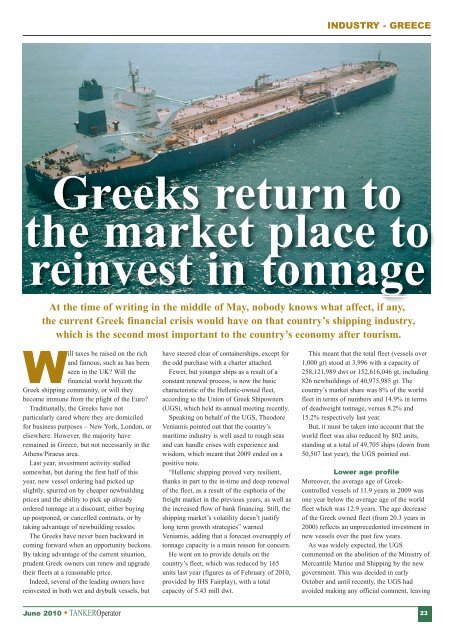Features: - Tanker Operator
Features: - Tanker Operator
Features: - Tanker Operator
Create successful ePaper yourself
Turn your PDF publications into a flip-book with our unique Google optimized e-Paper software.
INDUSTRY - GREECE<br />
Greeks return to<br />
the market place to<br />
reinvest in tonnage<br />
At the time of writing in the middle of May, nobody knows what affect, if any,<br />
the current Greek financial crisis would have on that country’s shipping industry,<br />
which is the second most important to the country’s economy after tourism.<br />
Will taxes be raised on the rich<br />
and famous, such as has been<br />
seen in the UK? Will the<br />
financial world boycott the<br />
Greek shipping community, or will they<br />
become immune from the plight of the Euro?<br />
Traditionally, the Greeks have not<br />
particularly cared where they are domiciled<br />
for business purposes – New York, London, or<br />
elsewhere. However, the majority have<br />
remained in Greece, but not necessarily in the<br />
Athens/Piraeus area.<br />
Last year, investment activity stalled<br />
somewhat, but during the first half of this<br />
year, new vessel ordering had picked up<br />
slightly, spurred on by cheaper newbuilding<br />
prices and the ability to pick up already<br />
ordered tonnage at a discount, either buying<br />
up postponed, or cancelled contracts, or by<br />
taking advantage of newbuilding resales.<br />
The Greeks have never been backward in<br />
coming forward when an opportunity beckons.<br />
By taking advantage of the current situation,<br />
prudent Greek owners can renew and upgrade<br />
their fleets at a reasonable price.<br />
Indeed, several of the leading owners have<br />
reinvested in both wet and drybulk vessels, but<br />
have steered clear of containerships, except for<br />
the odd purchase with a charter attached.<br />
Fewer, but younger ships as a result of a<br />
constant renewal process, is now the basic<br />
characteristic of the Hellenic-owned fleet,<br />
according to the Union of Greek Shipowners<br />
(UGS), which held its annual meeting recently.<br />
Speaking on behalf of the UGS, Theodore<br />
Veniamis pointed out that the country’s<br />
maritime industry is well used to rough seas<br />
and can handle crises with experience and<br />
wisdom, which meant that 2009 ended on a<br />
positive note.<br />
“Hellenic shipping proved very resilient,<br />
thanks in part to the in-time and deep renewal<br />
of the fleet, as a result of the euphoria of the<br />
freight market in the previous years, as well as<br />
the increased flow of bank financing. Still, the<br />
shipping market’s volatility doesn’t justify<br />
long term growth strategies” warned<br />
Veniamis, adding that a forecast oversupply of<br />
tonnage capacity is a main reason for concern.<br />
He went on to provide details on the<br />
country’s fleet, which was reduced by 165<br />
units last year (figures as of February of 2010,<br />
provided by IHS Fairplay), with a total<br />
capacity of 5.43 mill dwt.<br />
This meant that the total fleet (vessels over<br />
1,000 gt) stood at 3,996 with a capacity of<br />
258,121,989 dwt or 152,616,046 gt, including<br />
826 newbuildings of 40,975,985 gt. The<br />
country’s market share was 8% of the world<br />
fleet in terms of numbers and 14.9% in terms<br />
of deadweight tonnage, versus 8.2% and<br />
15.2% respectively last year.<br />
But, it must be taken into account that the<br />
world fleet was also reduced by 802 units,<br />
standing at a total of 49,705 ships (down from<br />
50,507 last year), the UGS pointed out.<br />
Lower age profile<br />
Moreover, the average age of Greekcontrolled<br />
vessels of 11.9 years in 2009 was<br />
one year below the average age of the world<br />
fleet which was 12.9 years. The age decrease<br />
of the Greek owned fleet (from 20.3 years in<br />
2000) reflects an unprecedented investment in<br />
new vessels over the past few years.<br />
As was widely expected, the UGS<br />
commented on the abolition of the Ministry of<br />
Mercantile Marine and Shipping by the new<br />
government. This was decided in early<br />
October and until recently, the UGS had<br />
avoided making any official comment, leaving<br />
June 2010 TANKER<strong>Operator</strong> 23
















